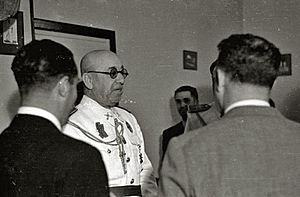José Moscardó Ituarte facts for kids
Quick facts for kids
José Moscardó
|
|
|---|---|
 |
|
| Birth name | José Moscardó Ituarte |
| Born | 26 October 1878 Madrid, Spain |
| Died | 12 April 1956 (aged 77) Madrid, Spain |
| Allegiance | |
| Service/ |
Army |
| Years of service | 1896–1948 |
| Rank | Captain General |
| Commands held | Military Governor of Toledo Captain General of Andalusia Captain General of Catalonia |
| Battles/wars | Philippine Revolution Rif War Spanish Civil War: Siege of the Alcázar |
| Awards | Laureate Cross of Saint Ferdinand |
| Signature | |
José Moscardó Ituarte (born October 26, 1878 – died April 12, 1956) was a Spanish military leader. He is best known for his role during the Spanish Civil War. He was the military governor of Toledo Province and supported the Nationalist side. His most famous action was defending the Alcázar of Toledo against Republican forces.
Before the war, Moscardó was a quiet and dutiful soldier. He was known for being very exact and religious. When the war started, he became the commander of the citadel (a strong fortress) in Toledo. His group included soldiers, police, and even some civilians. There were also many women and children seeking safety inside.
Contents
The Spanish Civil War
The Spanish Civil War was a big conflict in Spain from 1936 to 1939. It was fought between two main sides: the Nationalists and the Republicans. José Moscardó was a key figure on the Nationalist side.
Defending the Alcázar Fortress
The most famous event in Moscardó's life was the Siege of the Alcázar. This was a long battle for the Alcázar fortress in Toledo. Moscardó and his group held out for 70 days. This was from July 22 to September 27, 1936. Every day, Moscardó would send a radio report saying, Sin novedad en el Alcázar. This meant "Nothing new at the Alcázar," or "All quiet at the Alcázar." It was an ironic way to say they were still holding strong.
A Difficult Choice: His Son
During the siege, something very dramatic happened. On July 23, Republican forces captured Moscardó's 24-year-old son, Luis. They called the Alcázar and Moscardó answered the phone. The Republican officer told him that if he did not surrender the Alcázar, his son would be shot.
Moscardó asked to speak to Luis. He then told his son, "Give your soul to God and die like a patriot. Shout 'Long live Christ the King' and 'Long live Spain.'" Luis bravely replied, "That I can do." Luis was shot later, though not immediately. This event showed Moscardó's strong sense of duty.
Refusing to Surrender
On September 9, a Republican officer came to the Alcázar under a white flag. He offered to let the people inside live if they surrendered. Moscardó refused this offer. He only asked if a priest could be sent in to baptize children born during the siege. The Republicans agreed to this.
A priest named Canon Vásquez Camarassa entered the fortress. He urged the civilians, especially women and children, to leave. But everyone inside refused to go. They chose to stay and support the defenders.
The Alcázar is Relieved
Finally, on September 27, 1936, Nationalist forces arrived. They broke the siege and rescued Moscardó and his group. When the relief force commander arrived, Moscardó stood at attention. He famously said, "No change to report." He had lost his son, but he had saved his garrison.
The defense of the Alcázar became a huge symbol of heroism in Spain. Moscardó was promoted to Army General. He was seen as a hero by many.
A Symbol of Mourning
General Francisco Franco, the leader of the Nationalists, wanted to honor Moscardó. He allowed Moscardó to wear a special black cloak over his army uniform. This cloak was a symbol of mourning for his son. Moscardó wore it for the rest of his life. This way, every soldier who saw him knew who he was and what he had sacrificed.
Life After the War
After the Spanish Civil War ended in 1939, José Moscardó continued to serve Spain.
Later Military Roles
In late 1944, Moscardó was in charge of forces in Barcelona. He successfully defended the area against attacks by Spanish communists. In 1945, he became the head of Franco's personal military staff.
New Titles
In 1948, he was given important titles. He became the Count of the Alcázar de Toledo. He was also named a Grandee of Spain. This is a very high honor in the Spanish nobility.
Love for Football
Moscardó had a great passion for football. He even got to coach the Spanish national football team. He coached them at the 1948 London Olympic Games and the 1952 Games in Helsinki.
In 1947, he was responsible for changing the Spain National Football Team's main color back to red. The color had been changed after the war.
Death
José Moscardó died on April 12, 1956, in Madrid. He was 77 years old. After his death, he was given the highest military rank, Capitán General del Ejército.
See also
 In Spanish: José Moscardó para niños
In Spanish: José Moscardó para niños
 | William Lucy |
 | Charles Hayes |
 | Cleveland Robinson |

